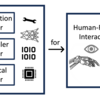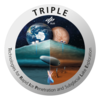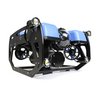Welcome
The Robotics Innovation Center (RIC) belongs to the Bremen location of the German Research Center for Artificial Intelligence (DFKI GmbH). Headed by Prof. Dr. Dr. h.c. Frank Kirchner, here scientists develop robot systems to be used for complex tasks on land, under water, in the air, and in space. The RIC closely cooperates with the Robotics Group at the University of Bremen.
The DFKI is the leading German research centre in relation to innovative software technology based on methods of Artificial Intelligence. It comprises sites in Kaiserslautern, Saarbrücken, Bremen and Lower Saxony, as well as laboratories in Berlin and Darmstadt, and branch offices in Lübeck and Trier.
For further information please visit this page.
Latest Projects
Latest Videos
ROMATRIS: (Partially) autonomous assistance robot for transporting materials in rough terrain
In the event of a disaster, every second counts. To save valuable time and increase the safety of emergency personnel, the DFKI Robotics Innovation Center is developing a (partially) autonomous assistance robot in close cooperation with the German Federal Agency for Technical Relief (THW). The innovative robot is able to follow rescue workers through rough terrain and transport material weighing more than 100 kilograms over uneven terrain. It can react to the gestures of the emergency services and move independently back and forth between two points on a predefined route. The DFKI researchers successfully tested the first version of the system at the THW test and training center in Hoya. The robot transported a 120-kilogram generator, safely crossed railroad tracks and climbed a dike hill. Despite the darkness, it was able to recognize people and respond to their commands. The task now is to implement the feedback from the emergency services and further develop the system accordingly. Once the project has been completed, the robots will soon be put into practical use and help to train emergency services in the use of robotic systems and increase the acceptance of new technologies.
RicMonk: A Three-Link Brachiation Robot with Passive Grippers for Energy-Efficient Brachiation
This paper presents the design, analysis, and performance evaluation of RicMonk, a novel three-link brachiation robot equipped with passive hook-shaped grippers. Brachiation, an agile and energy-efficient mode of locomotion observed in primates, has inspired the development of RicMonk to explore versatile locomotion and maneuvers on ladder-like structures. The robot's anatomical resemblance to gibbons and the integration of a tail mechanism for energy injection contribute to its unique capabilities. The paper discusses the use of the Direct Collocation methodology for optimizing trajectories for the robot's dynamic behaviors and stabilization of these trajectories using a Time-varying Linear Quadratic Regulator. With RicMonk we demonstrate bidirectional brachiation, and provide comparative analysis with its predecessor, AcroMonk - a two-link brachiation robot, to demonstrate that the presence of a passive tail helps improve energy efficiency. The system design, controllers, and software implementation are publicly available on GitHub.
ARTEMIS: At the THW test site in Hoya
ARTEMIS: First test run with a penetrometer
The rover Artemis, developed at the DFKI Robotics Innovation Center, has been equipped with a penetrometer that measures the soil's penetration resistance to obtain precise information about soil strength. Such measurements allow for conclusions about the current soil condition, applicable in both agricultural settings and space exploration. The video showcases an initial test run with the device mounted on the robot. During this test, the robot was remotely controlled, and the maximum penetration depth was limited to 15 mm.
RoLand: Agricultural Robotics
The aim of the project is to design and develop a semi-autonomous, mobile system that is capable of harvesting fruit independent of human interaction. While robotic systems are currently used mainly in greenhouses, the target scenario of the proposed project is the open field, taking into account the typical environmental influences associated with it. Taking into account a wide range of possible applications and a low investment volume, the aim is to develop a system that can also be operated economically by smaller farms. An adaptability of the work performance to the farm size-dependent demand is then given by the number of small systems working in parallel.
Quad B12: Initial Developments
The DFKI Quad B12 robot is an exciting research platform under development in the Underactuated Lab at DFKI RIC. The video showcases a range of behaviors that have been implemented on this quadrupedal robot.









